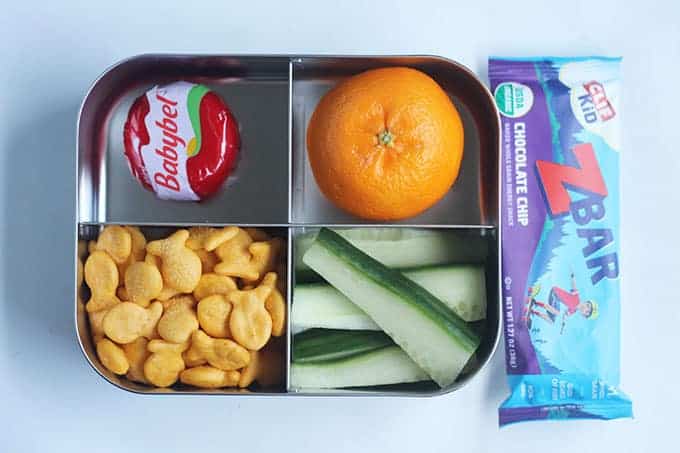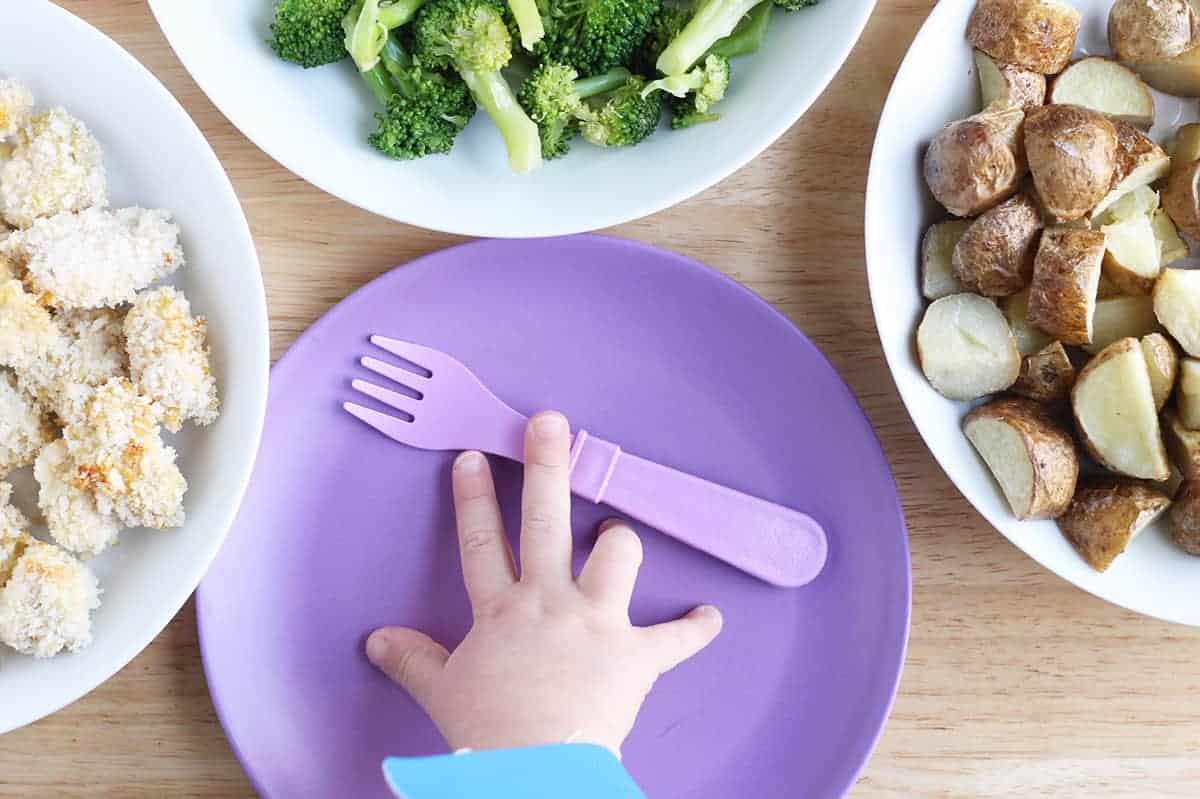[ad_1]
Here’s the scoop on why diets are never the answer to health issues our kids may have—and what you should do instead.

Kids and Diets
We all want to serve healthy food for kids and have them actually eat it. And for them to love their bodies. But we’re also given plenty of reasons to worry about our kids’ body weight, size and shape—especially if they fall on the higher end of the growth chart.
As parents, we get so much pressure to be doing things perfectly with our kids—from what they eat to which activities they do and what they’re naturally interested in.
And while we all want to raise kids who love eating healthy foods (and just the “right” amount of it!), there’s a lot of research that shows how too much pressuring, controlling, and even coercing can backfire in the big picture of raising healthy kids.
TIP: Read an explanation of how growth charts work here.
Meet Anna Lutz, RD
Anna Lutz, MPH, RD, of Sunny Side Up Nutrition in Raleigh, North Carolina is a pediatric dietitian who specializes in eating disorders and family feeding with a weight inclusive perspective. She’s such a wealth of information (and reassurance) on how to parent our kids when food issues are concerned—and how to notice when you might be attempting to parent a child’s weight. Her wise words:
It is not my job to control my child’s weight. I don’t need to parent perfectly for my child to have a certain weight.
My job is to model what it looks like to take care of my body and to set up a structure so children take care of the body they have. We focus on behaviors, not weight.

Do kids ever need to diet?
According to Anna: “I don’t think there’s a situation where dieting is helpful. Diets don’t work. People can restrict intake for a limited amount of time, but our bodies are meant to survive and weight comes back on and often times there’s a lot of collateral damage.”
And here’s more from Anna about what can happen to kids who are put on diet or have their food restricted.
- “They can become more obsessed about food.”
- “Their hunger and fullness cues become off.”
- “We set them up for a lifetime of weight cycling, which can be harmful.”
It’s so hard to let the kids just be during meals and snacks and to eat according to their own hunger. But if we want to raise tweens, teens, and adults who are able to eat without guilt or relying on external metrics, we need to give our kids the chance to flex their own intuitive eating muscles.
Which means we need to stop interfering so much in their meals—which could look like bartering, pressuring, and/or coercing food intake.
What about the “obesity epidemic”?
Remember that the way that kids are classified by weight changed overnight in the 1990s. And growth charts are based primarily on Caucasian kids from the 1960s and 1980s.
“It does look like kids may be growing faster, and there could be lots of things that affect that including food,” Anna says. “But the children we have, it is not their fault if children are growing quicker. The way we’re treating the ‘obesity epidemic’ is putting the onis on these young children, which is actually causing eating problems.”
Plus, she goes on to say that the fear that our culture has about weight right now sets the parent up to feel that they need to control what a child is eating—which can be damaging longterm for physical and emotional health.
Which is to say: Controlling what our kids eat is not the answer to raising healthy kids.
What do I do if my child is “overweight”?
You’d do the same you’d do for any child.
- Set them up with regular meals and snacks served at the table.
- Offer a range of foods, including their favorites and the foods you’d like them to also eat.
- Provide regular opportunities for physical activity with a focus on having fun.
- Provide regular opportunities for kids to learn about food without pressure—from kids books about food, cooking together, gardening, shopping at the farmer’s market, or simply deciding what to make for dinner together.
- Sit together for meals (as is feasible with your life) and engage with your child about their life and yours—instead of focusing on food.
- Remember that kids bodies are supposed to grow. It would be a problem if they didn’t! We can’t control how their bodies grow, but we can support them with clothes that fit and are comfortable and by not making choices based on their body size.

What if my child just wants snacks and “junk” food?
I know that a lot of us are worried about sugar, treats, and snacky foods—and how to raise healthy kids when those are the foods our kids prefer. Anna reminds us:
Take a deep breath and decide what’s within our control. And what is going to be the outcome if we were to intervene,” Anna recommends. Is it going to be more harmful to say you can’t have what every other child is eating or to let them enjoy the social situation and the food?
Consider instead which foods you bring into your house and when (and how) they’re served.
Anna says that this can be: “A process of letting kids learn to navigate these situations and learn to trust themselves around food.” And suggests that there might be some things on a structural level that we can influence without the kids ever knowing about it, such as talking to a soccer league about changing the expectations around snacks, for example.
Or buying more fresh fruit for snacks. Sometimes just giving kids the choice of which fruit they want—or which way they want it to be cut—can help make it more appealing.
It can also help to try not to label foods as good or bad (or “junk”), and to just call the food whatever it actually is—”snack bar”, “chips”, “yogurt”, etc.
TIP: Read more about what to do when kids want snacks, not meals.
The Role of Our Own Anti-Fatness
Parents may also be fixated on weight loss as a way to protect their kids from bullying or body shaming—because maybe those are experiences they had in their past or even in their present. But the problem is actually our culture making everyone fear large bodies.
“There’s nothing wrong with parents wanting to protect their children, but there’s nothing ethical that I can prescribe or recommend for a parent to change their child’s body,” Anna says.
Instead consider:
- “What in this home can we do to support this body that we have?”
- “How can I model body acceptance?
- “How can I talk about about what it means for everyone to have different bodies?”
And with older kids who may realize that they have larger bodies than some of their friends, it can help to acknowledge their concerns. At the same time, make sure to be clear that there is nothing wrong with anyone’s body, regardless of size.
As Virginia Sole-Smith said in a recent newsletter about talking to kids about diet culture:
A diet is when people try to make their bodies smaller by eating less food. It doesn’t work and it can make you sick, especially for kids who are growing and need to eat as much food as they want…
Your body is not the problem. You don’t ever need to make yourself smaller by dieting.
(Read the full newsletter here.)
And mostly: Let them know you are always here to talk about their concerns. Be their safe space!
TIP: I recommend reading Virginia’s book The Eating Instinct, and also Unapologetic Eating, What We Don’t Talk about When We Talk About Fat, and Intuitive Eating.

Best Kids Diet Plan
The best “diet plan” you can offer your children is to serve them a range of healthy foods at set meal and snack times, and allow them to eat what of it they want. You can read more about this approach called the Division of Responsibility here.
It’s such a great way to have happier meals and reduce power struggles at the table. And actually get to enjoy your own food too!
TIP: To learn more about this topic, you can hear us talk this through on our Comfort Food podcast. Download the episode from iTunes, Stitcher, Google Play, TuneIn Radio, or wherever else you get your podcasts— or listen to it below.
Questions? Comments? We’d love to hear from you so please comment below!
[ad_2]
Source link

